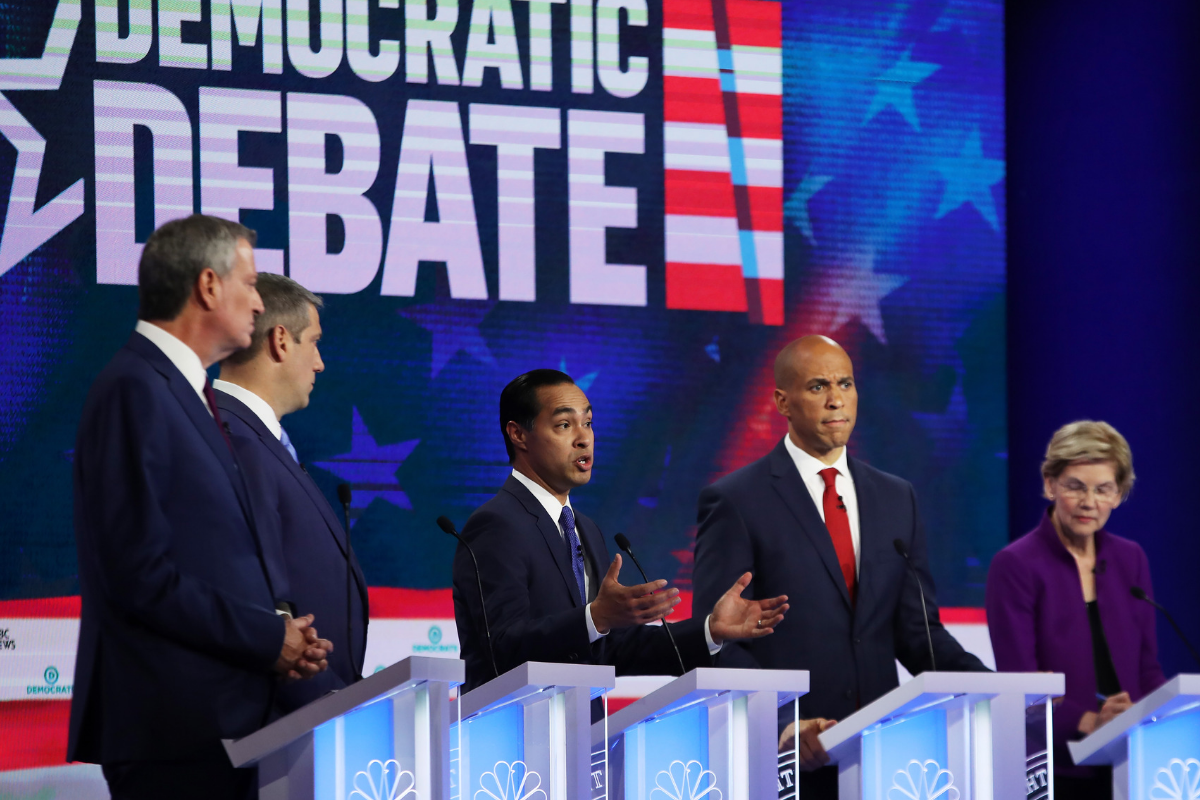

(L-R) New York City Mayor Bill De Blasio, Rep. Tim Ryan (D-OH), former housing secretary Julián Castro, Sen. Cory Booker (D-NJ) and Sen. Elizabeth Warren (D-MA) take part in the first night of the Democratic presidential debate on June 26, 2019 in Miami, Florida. (Photo by Joe Raedle/Getty Images)
By Sulma Arias and Grecia Lima
Last night, 10 of over 20 Democratic hopefuls took the stage in Detroit to debate their ideas and solutions to some of the most complex issues facing our country. Key among those issues is immigration and how to keep immigrant families like ours together, how to ensure all immigrant families thrive and how to end the hateful misery that the current administration inflicts on our families.
It’s their second go-round for debates and it’s been pretty clear from the first debate in Miami, Florida and from last night, which candidates have moved further in formulating bold solutions and which candidates were taking the safe route, speaking in platitudes and saying what they think the public wants to hear. Former HUD Secretary Julián Castro, the grandchild of Mexican immigrants, has spoken eloquently about solutions to remedy Donald Trump’s hate-filled agenda against immigrant communities. Other candidates, such as Sen. Kamala Harris, Gov. Jay Inslee of Washington, Sen. Elizabeth Warren, Sen. Cory Booker and Sen. Bernie Sanders, speak about inspiring visions that would keep families together and put a stop to the deportation machine that separates children from parents, husbands from wives and sisters from brothers.
Even those candidates, such as former Vice-President Joe Biden, who’ve seemed to hesitate on bold immigration solutions, have been pushed to the left of their previous positions.
Immigration remains on the forefront as our communities battle Donald Trump’s racism, xenophobia and hate. Candidates will continue to have to sharpen their positions around our immigration policies and their impact on families.
Watching the candidates square off has shown us how important it is to highlight how far we’ve come and how far we still have to go as an immigration movement.
It was obvious from the audience’s reaction in immigrant-heavy Florida last month that touting “comprehensive immigration reform” as your immigration stance isn’t enough anymore. A decade ago, the crowd would have cheered wildly at the mere mention of comprehensive reform. Newspapers would have led with the story on their front pages—the phrase alone was considered bold at the time.
Those days are long gone, and so are the days when trade-offs like militarizing southern border communities for permanent protections seem fair. Our safety and futures aren’t bargaining chips.
Today, candidates are discussing specific policies that decriminalize migration, provide healthcare for undocumented immigrants and abolish or defund ICE. Almost every one of the Democratic candidates seem to support ideas that would have been considered political suicide ten years ago. It’s shown us how we as immigration advocates have achieved a major breakthrough.
That kind of shift in hearts and minds didn’t happen in a vacuum. It was immigrants, leading a movement to make it happen. It is a victory that was more than 20 years in the making.
When we started 20 years ago, we tried to break through with the core idea of comprehensive immigration reform and presidential candidates were wary of discussing it.
But it took immigrants coming together, knocking on doors, making cold calls and later reaching out on social media to our communities to push the narrative. It took holding elected leaders accountable by showing up in the halls of Congress and in their district offices —whether their doors were open to us or not— to make our voices heard. It also meant that those of us who could, had a duty to vote for political leaders who support us.
When we hosted the first immigration presidential forum in Pasadena, California in May, four presidential hopefuls —Castro, Harris, Sanders and Inslee— discussed our demands for immigration reform. A few months ago, only two candidates had immigration platforms, but it didn’t take long for other candidates to follow suit.
Now, we need all the candidates to offer concrete solutions. We want to hear about the steps each candidate would take to reunite families. How will they make the road to citizenship equitable and affordable for all? Do they believe in expanding the definition of family to be more inclusive? What about the relationship between local law enforcement and immigration agencies—how will they end programs such as Section 287(g) and Secure Communities that erode immigrants’ trust in local law enforcement and make our communities less safe?
Candidates have a choice to make: Move to more progressive and inclusive policies for all families or align themselves with an established guard that hasn’t caught up to what the real America looks like.
Immigrant rights activists have been at this for a long time. Fighting every day for the rights, safety and future of all immigrants, even in the darkest moments. The changes we need demand a sustained commitment, not just talking points, even if they are said in Spanish. Because our fight continues. Just a few weeks ago, Congress approved $4.6 billion in funding for the deportation machine tearing immigrant and refugee families apart.
In 2017, people of color and citizens who are immigrants voted in droves, changing the political landscape of states such as Virginia. Last year, their votes flipped control of the House of Representatives. Next year, we will mobilize the largest bloc of voters of color and hold all parties accountable to deliver on their promises.
***
Sulma Arias is the interim director of immigrant rights and racial justice at Community Change Action. Grecia Lima is the political director at Community Change Action.


